Step Back in Time: The Historic Wonders of Jingzhou Ancient City
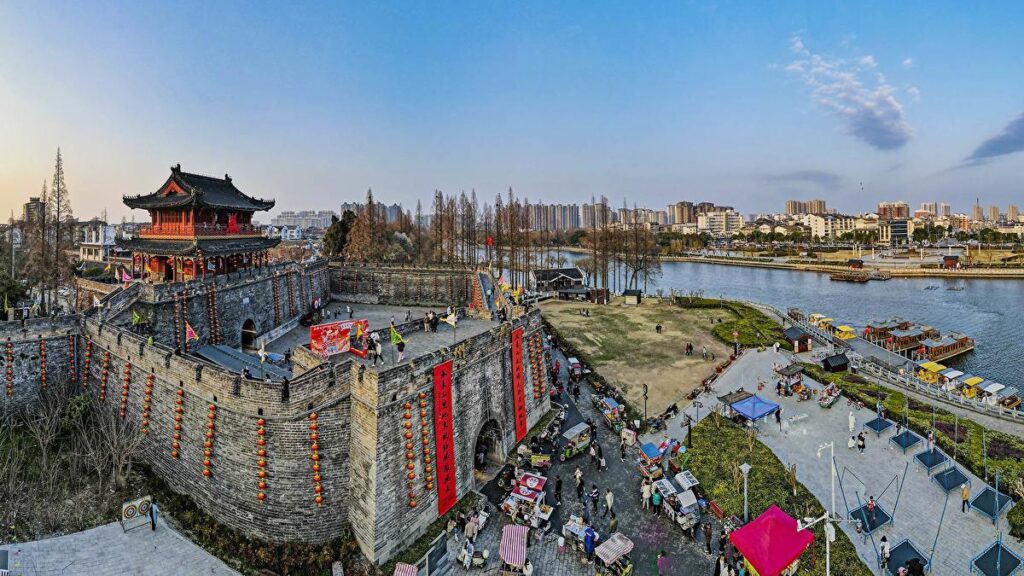
An Essential Guide to Visiting Jingzhou Ancient City
In This Guide
- An Essential Guide to Visiting Jingzhou Ancient City
- The Rich History and Legends of Jingzhou Ancient City
- Main Highlights: What You Absolutely Can’t Miss
- Planning Your Visit: A Practical Guide
- Tickets: Prices, Booking, and Tips
- How to Get There: A Complete Transportation Guide
- Local Cuisine and Accommodation Nearby
- Frequently Asked Questions
- Final Thoughts on Your Trip
Visiting Jingzhou Ancient City is akin to stepping back in time, where the echoes of history resonate through its well-preserved walls and vibrant culture. Nestled in the heart of Hubei Province, this city serves as a captivating glimpse into China’s rich heritage, showcasing the remnants of the Chu Culture that once thrived here over two millennia ago.
As you wander through the Jingzhou Historical and Cultural City Area, you are greeted by majestic city walls, considered among the best-preserved in southern China. Spanning nearly 10.5 kilometers, these ancient fortifications invite you to stroll along their pathways, offering stunning views of both the urban landscape and the serene waters that encircle the city. Climbing to the top of the East Gate Watch Tower provides a breathtaking panorama, allowing you to appreciate the intricate blend of history and modernity that defines Jingzhou.
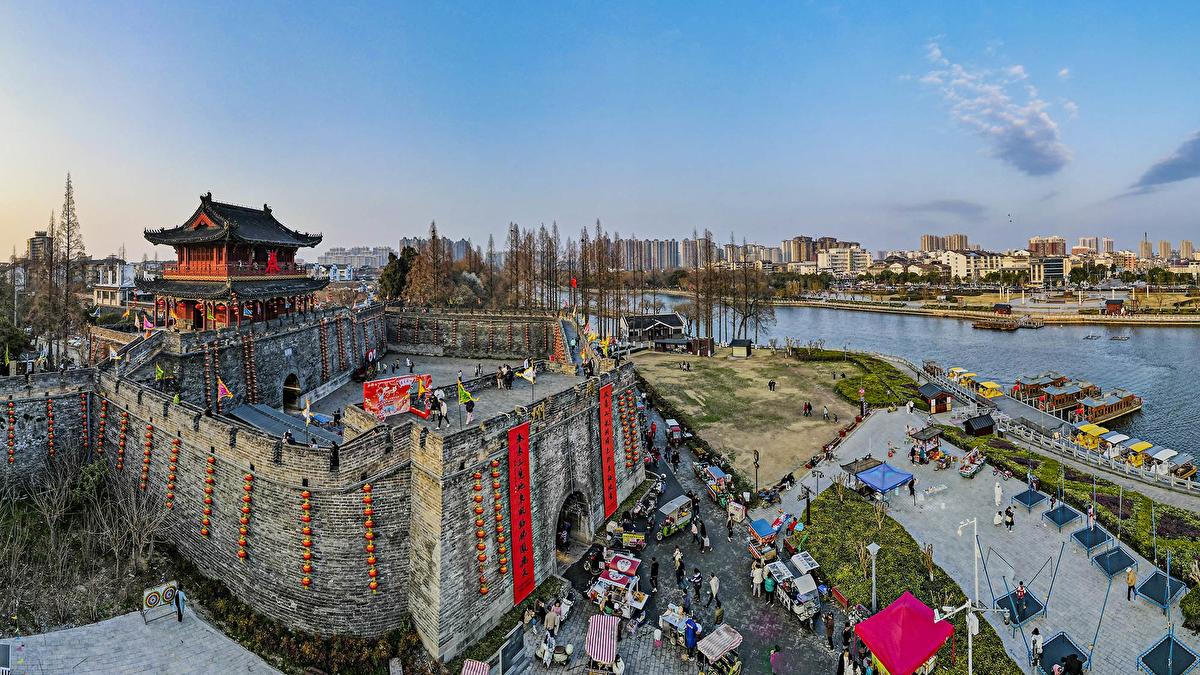
Jingzhou Ancient City.
The city is not merely a historical site; it is a vibrant community where traditional Chinese architecture meets contemporary life. From the lively streets filled with local shops to the tranquil parks perfect for a picnic, Jingzhou embodies a harmonious balance between past and present. Statues and historical markers along your walk provide not just photo opportunities but also stories waiting to be uncovered.
Whether you are an avid history buff or simply looking for a picturesque escape, Jingzhou Ancient City promises an enriching experience. This guide will help you navigate its treasures, ensuring that your journey through this historical gem is both enjoyable and enlightening. Prepare to immerse yourself in the charm of Jingzhou, where every corner reveals a new chapter of China’s storied past.
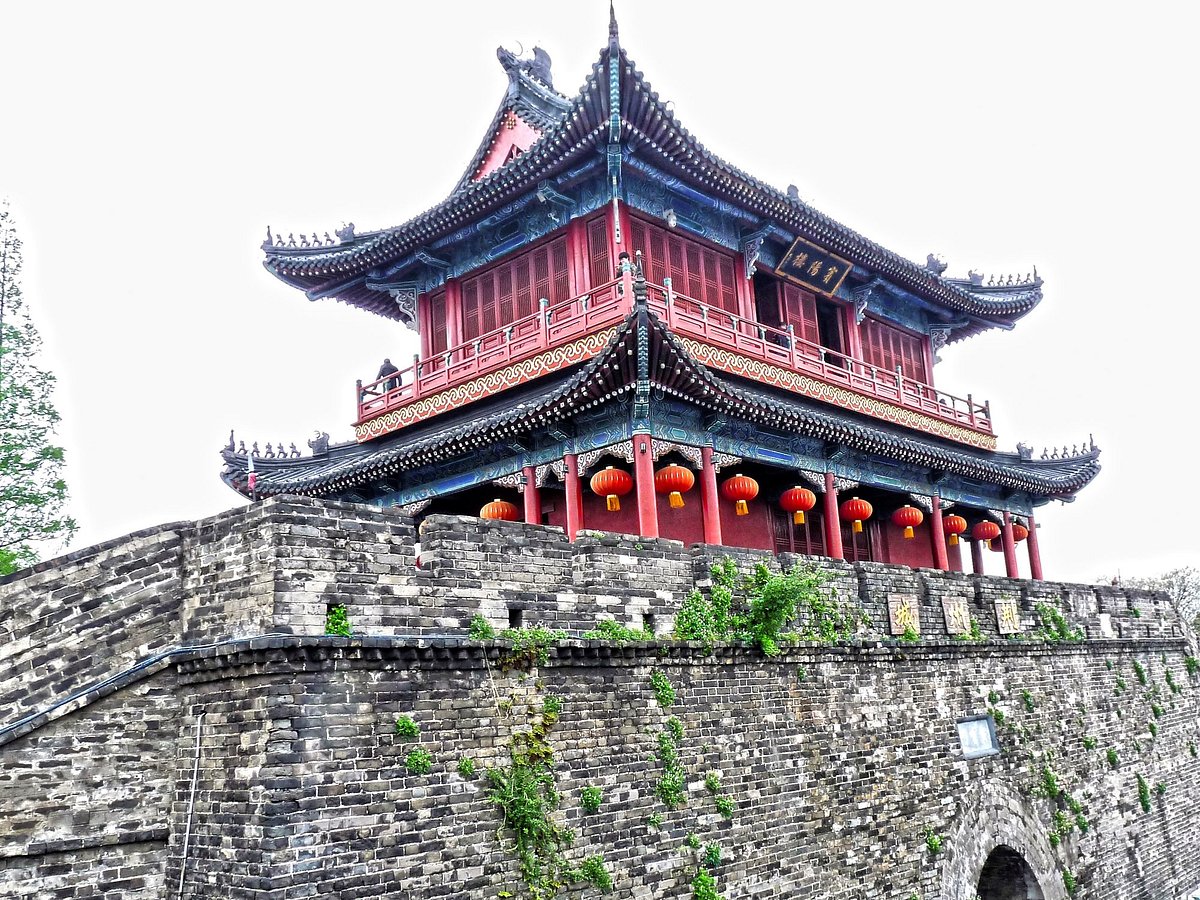
Jingzhou Ancient City.
The Rich History and Legends of Jingzhou Ancient City
Nestled in the heart of Hubei Province, Jingzhou Ancient City (荆州古城) is a treasure trove of Chinese history, culture, and legends. Its well-preserved city walls and historic architecture whisper tales from thousands of years ago, making it a must-visit for anyone intrigued by China’s rich past.
A Historical Overview
Jingzhou has played a pivotal role throughout Chinese history, particularly as a significant military and cultural center during the Warring States period (475-221 BC). It was the cradle of the Chu Culture, known for its arts, literature, and distinct dialects. As the capital of the State of Chu, Jingzhou became a hub for trade and military strategy, controlling key waterways that were vital for commerce and communication.
The city walls, some of the best-preserved in southern China, date back to the Eastern Han Dynasty (25-220 AD) and have been rebuilt and reinforced over the centuries, particularly during the Ming and Qing Dynasties. The walls stretch over 10 kilometers, offering a fascinating glimpse into ancient military architecture. Visitors can walk along the ramparts, which rise majestically to provide expansive views of the cityscape and surrounding landscapes.
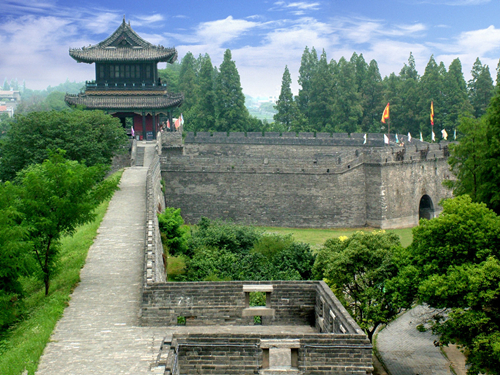
Jingzhou Ancient City.
Legends of Jingzhou
Jingzhou is steeped in legends that intertwine history with mythology. One of the most famous tales is that of Guan Yu, the legendary general from the Three Kingdoms period (220-280 AD). Revered as a symbol of loyalty and righteousness, Guan Yu is believed to have spent time in Jingzhou, where he defended the city against rival forces. His legacy is celebrated in the city, with a massive bronze statue dedicated to him standing as a testament to his enduring influence.
Another captivating legend involves the Dragon King of the Yangtze River, who is said to have protected the city from floods and invasions. According to local folklore, the Dragon King would rise from the river during times of danger, summoning rain to save the people of Jingzhou. This blend of reverence for nature and belief in mythical protectors reflects the deeply rooted cultural heritage that characterizes the region.
Architectural Wonders
Jingzhou Ancient City is not just about its walls; the city is adorned with stunning historical architecture. The East Gate Watch Tower offers visitors a panoramic view of the ancient city and its surroundings, making it a popular spot for photography and reflection. The streets are lined with traditional buildings that showcase various architectural styles, evidence of the city’s evolution over the centuries.
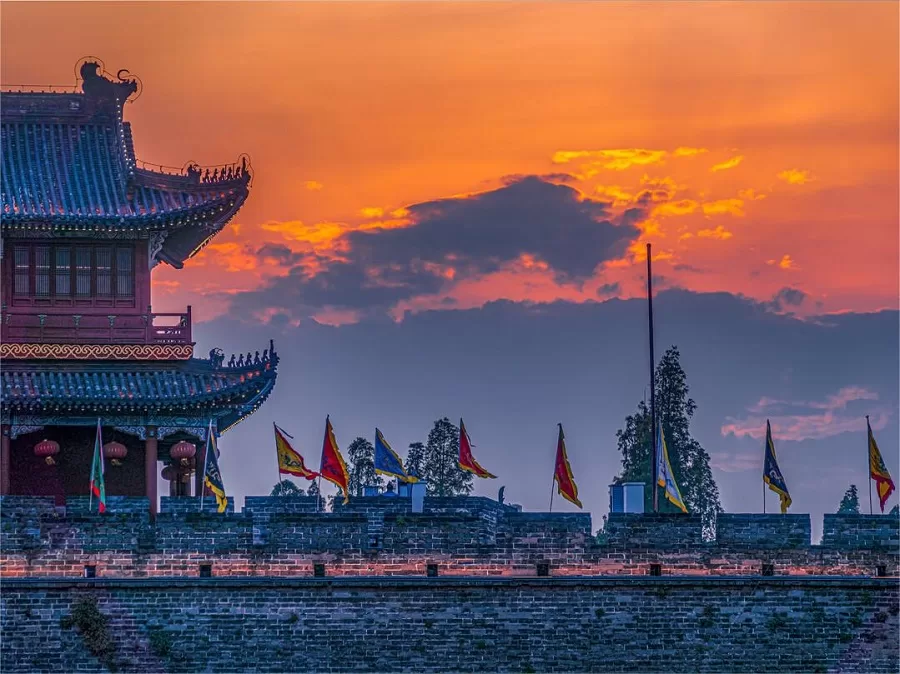
Jingzhou Ancient City.
The Jingzhou Museum nearby houses artifacts that narrate the story of the city and its people, from ancient relics to exquisite pottery, providing further context to the legends and history that permeate the area.
Conclusion
A visit to Jingzhou Ancient City is like stepping back in time, where history and legend coexist in a harmonious tapestry that tells the story of China’s past. Whether walking along the ancient city walls, exploring the legends of Guan Yu, or absorbing the rich culture that has flourished here for millennia, travelers will find that Jingzhou is a remarkable destination for those seeking to understand the depth of Chinese history and culture.
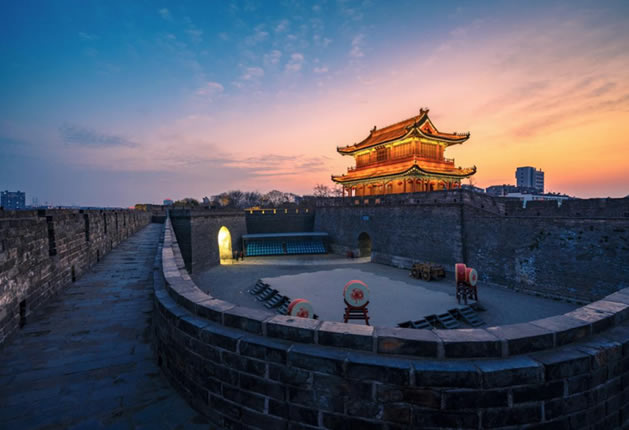
Jingzhou Ancient City.
Main Highlights: What You Absolutely Can’t Miss
Discover the Gems of Jingzhou Ancient City
Nestled in the heart of Hubei province, Jingzhou Ancient City offers a rich tapestry of history, culture, and natural beauty. As you wander through its well-preserved streets, you will encounter remnants of a glorious past that once positioned this city as a pivotal center during the Chu Kingdom and beyond. Here are the must-see highlights that you absolutely cannot miss during your visit to this ancient gem.
1. The Ancient City Walls
One of the best-preserved city walls in southern China, the Jingzhou Ancient City Wall is a breathtaking testament to the ingenuity of ancient engineering. Spanning approximately 10.5 kilometers, these walls date back to the East Han Dynasty (25 AD – 220 AD).
- What to Do: Stroll along the walkways, which are in excellent condition, and climb to the East Gate Watch Tower for panoramic views of the city. Don’t forget your camera—there are plenty of statues along the walls that make for perfect photo opportunities!
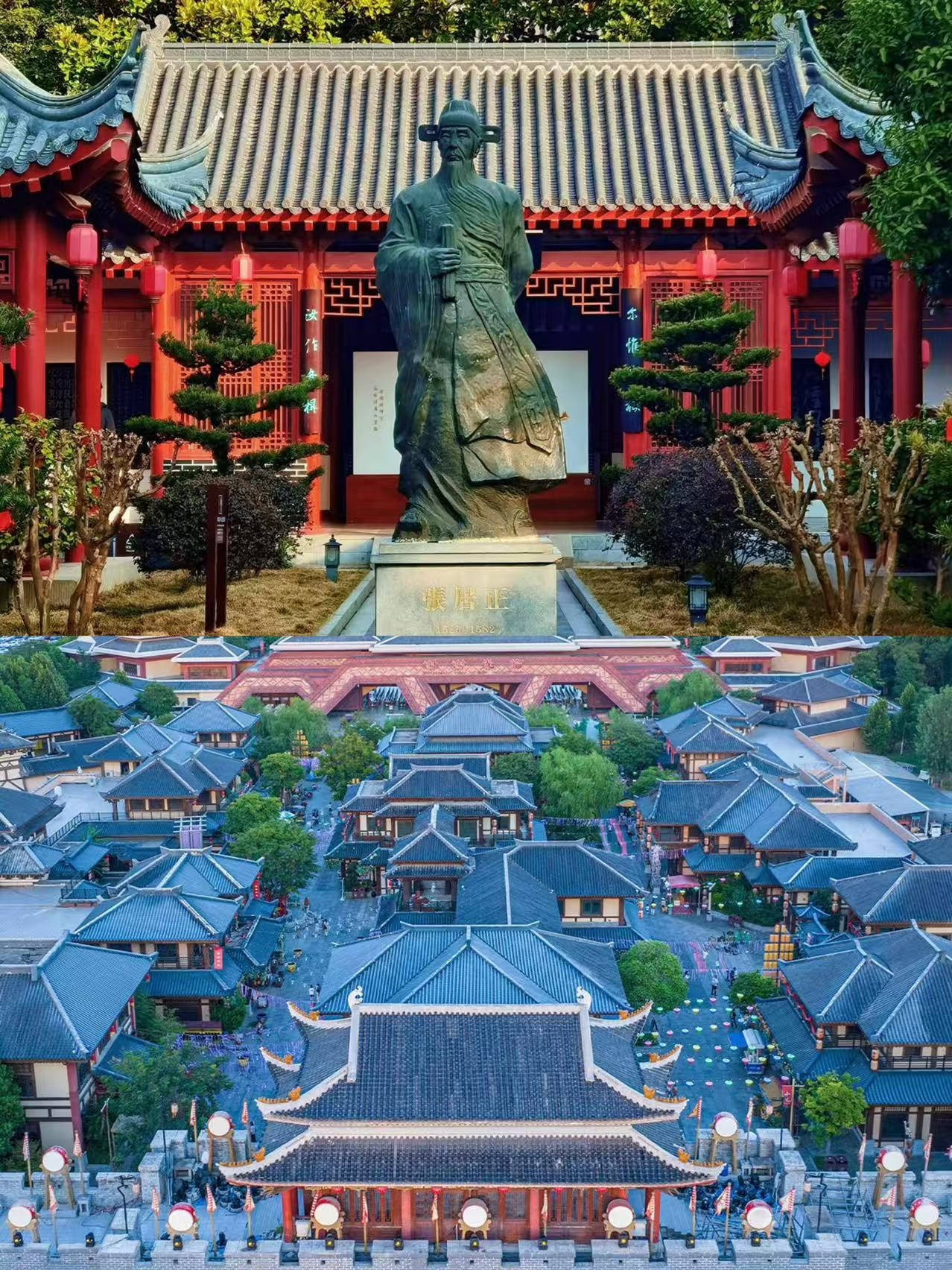
Jingzhou Ancient City.
2. Jingzhou Historical Park
Located within the ancient city, Jingzhou Historical Park is a serene escape that invites leisurely exploration. With lush gardens, historical architecture, and a relaxing atmosphere, this park is ideal for a picnic or a quiet afternoon.
- Activities: Rent a small boat for a leisurely glide along the waterways, or simply enjoy the beautiful surroundings and take in the historical significance of the area. Best of all, there is no entry fee!
3. The Chu Culture
Jingzhou is not just an ancient city; it is the cradle of Chu Culture, one of the most influential cultural movements in Chinese history.
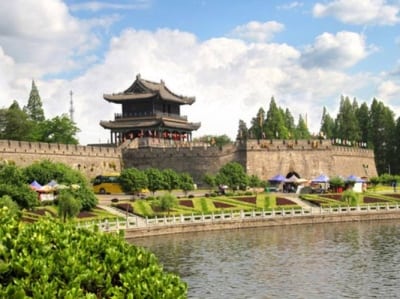
Jingzhou Ancient City.
- Explore: Visit local museums and historical sites that showcase artifacts and exhibits related to this fascinating culture, which flourished over two millennia ago.
4. Local Cuisine
No visit to Jingzhou is complete without indulging in the local culinary delights. The city offers a variety of traditional Hubei dishes that reflect its rich cultural heritage.
- Recommendations: Try the famous ‘Dried Fish’ or ‘Wuhan Hot Dry Noodles’ at local eateries, where you can experience authentic flavors that have been passed down through generations.
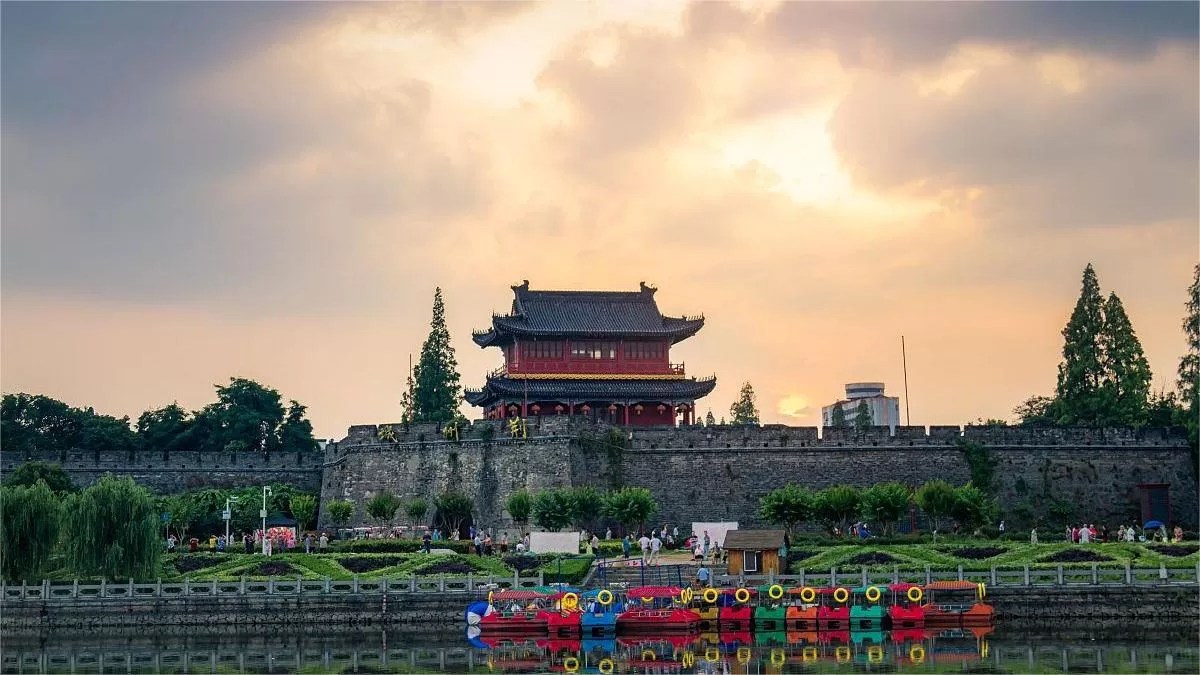
Jingzhou Ancient City.
5. Jingzhou Museum
A short distance from the ancient city, the Jingzhou Museum is a treasure trove of historical artifacts, including ancient pottery, bronzes, and relics from the Chu Kingdom.
- Highlights: Don’t miss the impressive exhibits that showcase the city’s history and its significance in ancient China. The museum is a perfect complement to your exploration of the ancient city.
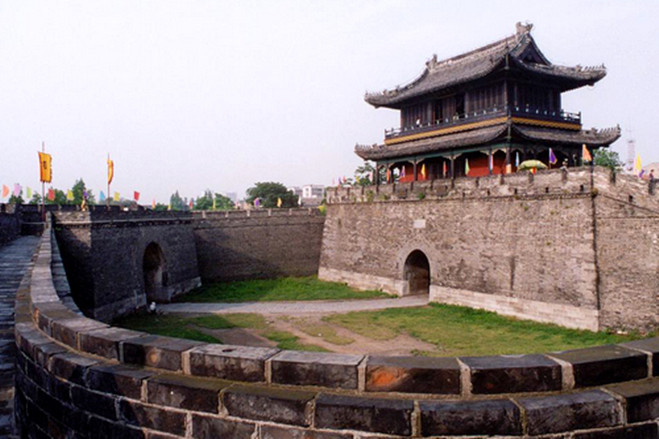
Jingzhou Ancient City.
6. Cultural Performances
Jingzhou often hosts cultural performances and events in the historical park and surrounding areas.
- What to Look For: From traditional music and dance to re-enactments of historical events, these performances offer a glimpse into the vibrant culture and history of the region.
7. Nearby Attractions
While in Jingzhou, consider exploring nearby attractions, such as the Giant Bronze Statue of Guan Yu, a landmark that commemorates the legendary figure of Chinese history, and the Xuanmiao Taoist Temple, which adds a spiritual dimension to your visit.
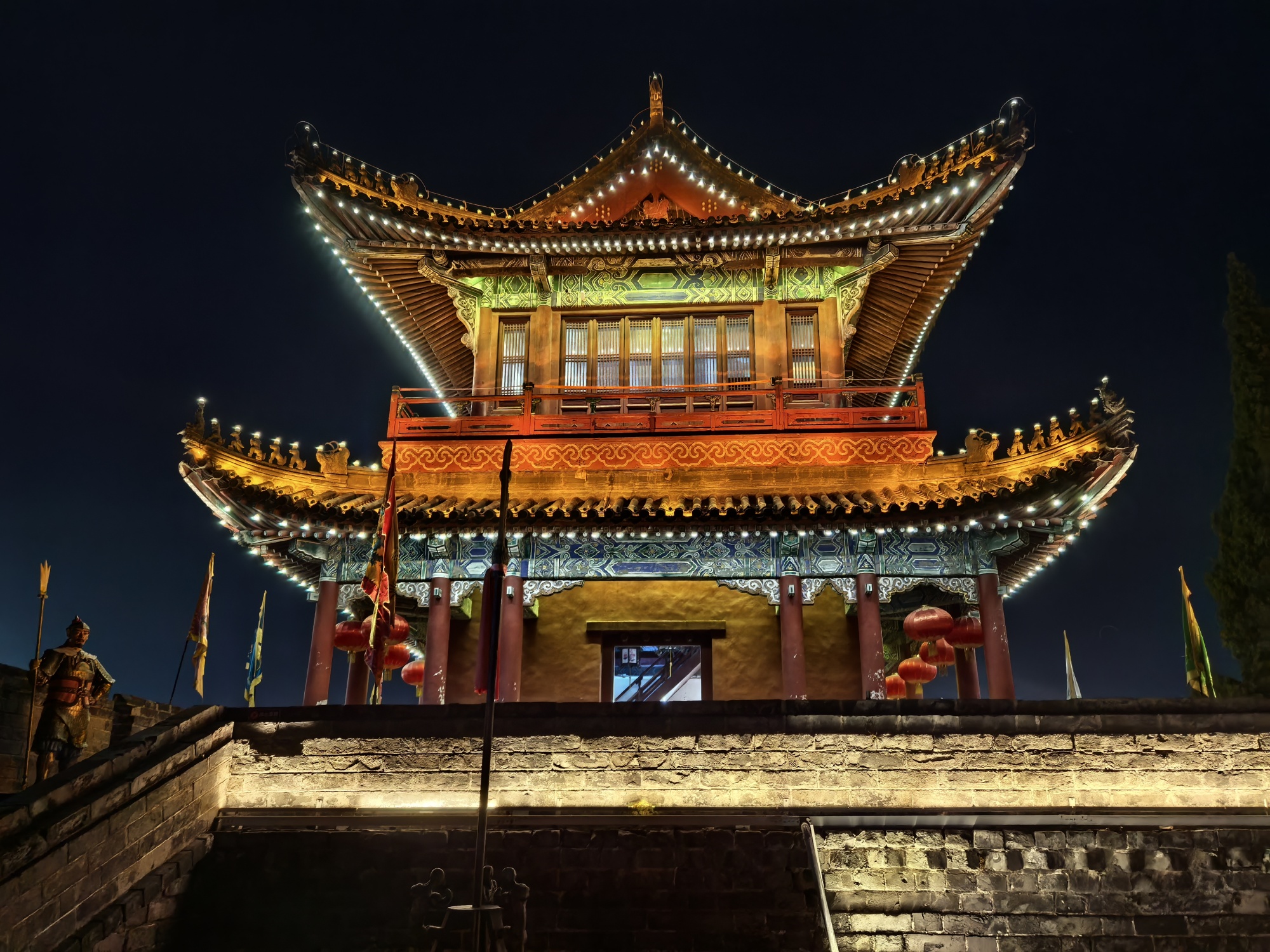
Jingzhou Ancient City.
Conclusion
Jingzhou Ancient City is a captivating blend of history, culture, and natural beauty. Whether you’re wandering along ancient walls, savoring local delicacies, or immersing yourself in rich cultural experiences, the city promises unforgettable memories. Don’t miss out on this historical treasure during your travels through China!
Planning Your Visit: A Practical Guide
Discovering Jingzhou Ancient City: Your Essential Travel Guide
Jingzhou Ancient City, known for its rich history and cultural significance, offers a unique glimpse into China’s past. Located in Hubei province, this charming destination boasts one of the best-preserved ancient city walls in southern China and is a must-visit for any traveler intrigued by Chinese history and culture. Here’s how to plan your visit to make the most of your experience.
Getting There
By Air:
The nearest major airport is Wuhan Tianhe International Airport (WUH), approximately 150 kilometers away. From the airport, you can take a train or a long-distance bus to Jingzhou.
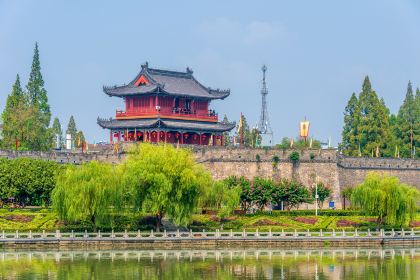
Jingzhou Ancient City.
By Train:
Jingzhou has its own railway station, making it accessible via high-speed trains from major cities such as Wuhan and Guangzhou. This is one of the most convenient ways to reach the city.
By Bus:
Long-distance buses connect Jingzhou with various cities in Hubei and beyond. The bus station is centrally located, providing easy access to local attractions.
Best Time to Visit
The ideal times to explore Jingzhou are spring (March to May) and autumn (September to November), when the weather is mild and the scenery is particularly beautiful. Summer can be hot and humid, while winter can be quite cold.
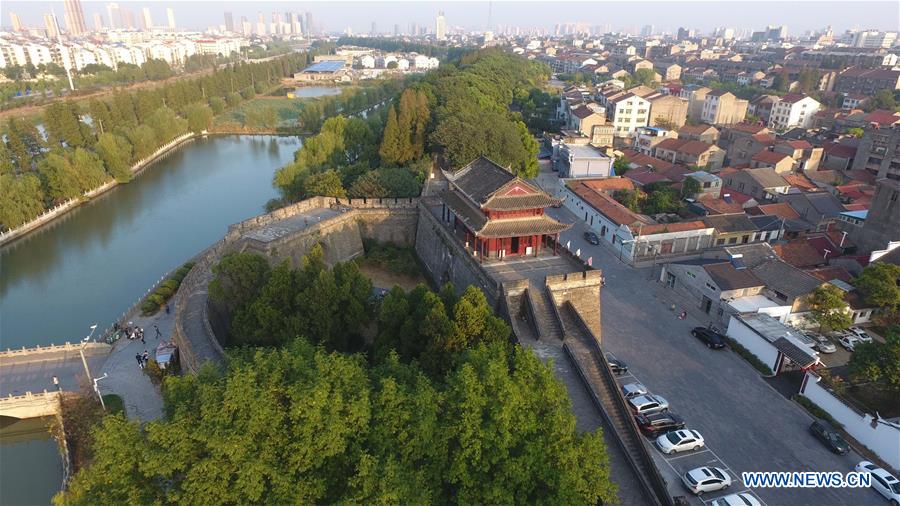
Jingzhou Ancient City.
Entry and Access
The Jingzhou Historical and Cultural City Area is open 24/7, allowing you to explore at your convenience. Fortunately, entry to many of the attractions, including the iconic city wall, is free of charge. This accessibility allows for leisurely strolls and impromptu visits at any time of day.
Key Attractions
- Ancient City Wall
-
Spanning about 10.5 kilometers, the wall is a remarkable feat of ancient engineering. You can walk along the well-preserved pathways, and there are several viewing towers, including the East Gate Watch Tower, which offers stunning panoramic views of the city.
-
Historical Park
-
This lovely park features scenic paths, statues, and areas for picnicking. It’s an excellent spot to relax and enjoy the historical ambiance.
-
Cultural Landmarks
- Venture to the Jingzhou Museum and the Xuanmiao Taoist Temple, both of which provide deeper insights into the local culture and history. The Giant Bronze Statue of Guan Yu is also a highlight, representing the city’s connection to the legendary Three Kingdoms era.
Local Cuisine
While you’re in Jingzhou, don’t miss the opportunity to sample Hubei cuisine. Local specialties include fish dishes, tangyuan (glutinous rice balls), and hot and sour soup. Numerous restaurants are available near the city wall and within the park area.
Tips for Visitors
- Wear Comfortable Shoes: The city is best explored on foot, so comfortable walking shoes are essential.
- Stay Hydrated: Bring water, especially during warmer months, to stay refreshed as you explore the city.
- Capture the Moment: With its stunning architecture and historical landmarks, Jingzhou is a photographer’s paradise. Don’t forget to capture your experiences!
Nearby Attractions
If you have extra time, consider visiting nearby sites such as:
– Wanshou Park: A beautiful park perfect for a leisurely stroll.
– Jiangling Monument Court: A site of historical importance reflecting the region’s rich past.
Conclusion
Jingzhou Ancient City offers a delightful blend of history, culture, and natural beauty. With its well-preserved city wall and vibrant local attractions, it stands as a testament to China’s rich heritage. Whether you’re a history buff or simply looking to explore a unique destination, Jingzhou promises an enriching experience that will linger in your memories long after you leave.
Tickets: Prices, Booking, and Tips
Visiting Jingzhou Ancient City: Ticket Information and Booking Tips
Exploring the historical and cultural richness of Jingzhou Ancient City (荆州古城) is a journey through time, and planning your visit with the right ticket information and booking strategies can enhance your experience.
Entry Fees
One of the highlights of Jingzhou Ancient City is that there is no entry fee for the park itself, making it an accessible destination for all travelers. You can stroll along the well-preserved ancient city walls, which stretch approximately 10.5 kilometers, without incurring any costs.
Additional Attractions
While the main park area is free, some specific attractions within or nearby may require tickets, such as museums or special events. Here are a few examples:
- Jingzhou Museum: Admission is typically very affordable, often around ¥20 (approximately $3) for entry.
- Special Exhibitions or Cultural Performances: Check local listings, as prices may vary based on the event.
Booking Tips
To make the most of your visit to Jingzhou Ancient City, consider the following tips:
-
Plan Ahead: While entry to the park is free, if you wish to visit specific exhibitions or performances, it’s wise to check the schedules and buy tickets in advance, especially during peak tourist seasons.
-
Guided Tours: If you’re keen on a deeper understanding of Jingzhou’s history, consider booking a guided tour. Many local companies offer half-day or full-day tours that include transportation, entry fees, and expert commentary. Prices typically range from ¥200 to ¥500 ($30 to $75), depending on the inclusions.
-
Transportation: Depending on your accommodation, you may need to arrange transportation to Jingzhou. Local taxis and rideshare options are available, and many hotels can assist with bookings. If you’re traveling from nearby cities, trains and buses frequently operate to Jingzhou, with fares generally around ¥50 to ¥100 ($7 to $15).
-
Timing Your Visit: The park is open 24 hours, but for a more vibrant experience, consider visiting during daylight hours when various cultural activities might be taking place. Early mornings or late afternoons can provide a quieter atmosphere to enjoy the spectacular views from the city walls.
-
Photography and Relaxation: Bring your camera! The city walls and surrounding areas are picturesque, perfect for photography. There are also tables and resting areas available if you wish to enjoy a packed lunch amidst the historical backdrop.
Summary
Jingzhou Ancient City welcomes travelers with its rich heritage and beautiful landscapes without the burden of entry fees. By planning ahead and considering guided tours, you can fully immerse yourself in the charm and history of this remarkable destination. Whether it’s a leisurely walk along the ancient walls or a visit to one of the local museums, Jingzhou promises an unforgettable experience steeped in Chinese culture.
How to Get There: A Complete Transportation Guide
Navigating Your Way to Jingzhou Ancient City
Jingzhou Ancient City, renowned for its well-preserved city walls and rich historical significance, is a must-visit destination for those delving into China’s storied past. Located in Hubei Province, this ancient gem is accessible through various transportation options, making it convenient for international travelers. Here’s your comprehensive guide to getting to Jingzhou Ancient City.
By Air
Closest Airport: Jingzhou Liuji Airport (YIH)
Jingzhou is serviced by Jingzhou Liuji Airport, which is approximately 30 kilometers (about 18 miles) from the city center. Though it is a smaller airport, it has domestic flights connecting to major cities like Beijing, Shanghai, and Guangzhou.
- From the Airport to Jingzhou:
- Taxi: The most straightforward option is to take a taxi from the airport, which takes about 30 minutes and costs approximately 80-100 RMB (around $12-15 USD).
- Airport Shuttle: Check for shuttle services that may operate during peak travel seasons.
By Train
Jingzhou Railway Station
The city is well connected by rail, making it an excellent choice for travelers coming from other regions.
- High-Speed Trains:
- High-speed trains are available from major cities like Wuhan (approximately 1.5 hours) and Yichang (around 2 hours). These trains offer comfortable seats and scenic views of the countryside.
-
Ticket prices vary based on the class of service, but expect to pay between 100-200 RMB ($15-30 USD).
-
Local Transportation from the Railway Station:
- Taxi: A taxi ride from Jingzhou Railway Station to the Ancient City takes about 10-15 minutes and costs around 20-30 RMB ($3-5 USD).
- Public Bus: Local buses are available, but they may require more time and effort if you’re unfamiliar with the routes.
By Bus
Long-Distance Bus Services
Jingzhou is accessible via long-distance buses from numerous nearby cities. This option can be economical and offers a glimpse into local life.
- Bus Stations: The main bus station is near the city center, making it easy to reach your accommodation or the Ancient City.
- Travel Time: Depending on your departure city, bus travel times can range from 2 to 6 hours.
- Cost: Bus fares typically range from 50-150 RMB ($8-23 USD).
By Car
Self-Driving or Car Rentals
For those who prefer the freedom of driving, renting a car is a viable option.
- Road Conditions: Major roads leading to Jingzhou are generally in good condition. The city is well-signposted, making navigation relatively easy.
- Parking: Parking is available near the Ancient City, but be mindful of local regulations and fees.
Local Transportation
Once in Jingzhou, getting around is quite straightforward:
- Walking: The Ancient City area is pedestrian-friendly, offering scenic walking paths along the ancient walls and through historical sites.
- Bicycles: Bicycle rentals are available, allowing you to explore at your own pace while enjoying the fresh air.
- Golf Carts: For a quicker overview, consider hiring a golf cart with a driver to tour the Ancient City.
Conclusion
Jingzhou Ancient City is not only a window into China’s rich cultural heritage but also an easily accessible destination for international travelers. Whether you choose to arrive by air, train, bus, or car, you’ll find that the journey to this historical enclave is just as rewarding as the experience of exploring its ancient walls and vibrant streets. Safe travels!
Local Cuisine and Accommodation Nearby
Discovering Jingzhou: Culinary Delights and Comfortable Stays
Exploring the rich history of Jingzhou Ancient City (荆州古城历史文化旅游区) is an experience that tantalizes not just the mind but also the palate. As you wander through this beautifully preserved city, take the time to savor its local cuisine and find a cozy place to rest your head after a day of adventure.
Local Cuisine
When it comes to food, Jingzhou offers a delightful array of options that reflect the flavors of Hubei province. Here are some must-try dishes and where to find them:
-
Hubei Hot Dry Noodles (热干面): A local breakfast favorite, these noodles are served cold with a rich sesame paste, pickled vegetables, and a sprinkle of chopped scallions. Head to Hunan Dawancai, conveniently located just 0.2 miles from the ancient city, to sample this staple.
-
Fish Head Stew (剁椒鱼头): Known for its savory and spicy flavor, this dish features fish heads simmered with fermented chili peppers. Enjoy it at Jingzhou Restaurant, where traditional cooking methods bring out the best in local ingredients.
-
Steamed Buns (包子): These fluffy buns filled with pork or vegetables make for a great snack. You can find them at local street vendors around the city walls, perfect for a quick bite as you explore.
-
Mao’s Braised Pork (毛氏红烧肉): A rich and indulgent dish, this pork is slow-cooked to perfection with soy sauce and spices. Try it at Chuan Chuan Yu, a popular dining spot among locals.
-
Tujia Cuisine: Local Tujia dishes are also worth exploring, with their unique blend of flavors and ingredients. Look for restaurants that specialize in Tujia fare for an authentic experience.
Accommodation Nearby
After indulging in Jingzhou’s culinary delights, rest easy in one of the nearby accommodations that offer comfort and convenience:
-
Jingzhou International Hotel: Located just a short distance from the ancient city, this hotel provides modern amenities, comfortable rooms, and a rooftop terrace with stunning views of the city skyline. It’s perfect for travelers looking for a blend of luxury and accessibility.
-
Jingzhou Ancient City Youth Hostel: For those on a budget, this hostel offers a friendly atmosphere and dormitory-style accommodations. It’s just a few minutes’ walk from the city walls, making it an ideal base for exploration.
-
Hubei Jingzhou Hotel: This establishment combines traditional charm with modern comfort. Enjoy spacious rooms, an on-site restaurant serving local dishes, and easy access to major attractions.
-
Jingzhou Huayi Hotel: Another great option, this hotel caters to both business and leisure travelers, featuring well-appointed rooms and a convenient location near Jingzhou Museum.
Wrapping Up
Jingzhou Ancient City is not only a gateway to the past but also a culinary treasure waiting to be explored. With its delicious local dishes and a variety of accommodation options, your visit will be both enriching and comfortable. So, whether you’re savoring a bowl of hot dry noodles or resting in a cozy hotel, Jingzhou is sure to leave a lasting impression.
Frequently Asked Questions
Frequently Asked Questions
1. What is Jingzhou Ancient City known for?
Jingzhou Ancient City is renowned for its well-preserved city walls, which are among the best in southern China. The city has historical significance as the cradle of the Chu Culture and played a vital role in Chinese history, particularly during the Three Kingdoms period. Visitors can explore ancient architecture, historic sites, and scenic parks that reflect the city’s rich cultural heritage.
2. How can I get to Jingzhou Ancient City?
Jingzhou is accessible via various modes of transportation. The nearest major city is Wuhan, which is about 300 kilometers away. You can take a high-speed train from Wuhan to Jingzhou, which typically takes around 1.5 to 2 hours. Alternatively, buses and private car hires are also available from nearby cities.
3. Is there an entry fee to visit Jingzhou Ancient City?
No, there is no entry fee to access the Jingzhou Historical and Cultural City Area, including the ancient city walls and parks. This makes it an affordable destination for travelers looking to immerse themselves in Chinese history and culture.
4. What are the must-see attractions within the city?
While exploring Jingzhou Ancient City, don’t miss:
– The Ancient City Wall: Walk along the approximately 8-mile-long wall and climb the East Gate Watch Tower for panoramic views.
– Jingzhou Museum: Discover artifacts and exhibitions related to the city’s history and culture.
– Guangong Hall: A historic site dedicated to the legendary warrior Guan Yu.
– Statues and sculptures throughout the city that provide great photo opportunities.
5. What is the best time to visit Jingzhou Ancient City?
The best time to visit Jingzhou is during the spring (March to May) and autumn (September to November) months when the weather is mild and pleasant. Summers can be hot and humid, while winters can be chilly. Festivals and cultural events often occur in the spring and autumn, providing a richer experience for visitors.
6. Are there any facilities for tourists?
Yes, Jingzhou Ancient City is equipped with various facilities to enhance your visit. There are rest areas, picnic tables in the parks, and small rental boats available for leisurely rides on the river. Additionally, local shops offer snacks and souvenirs, and there are options for guided tours if you prefer a more structured experience.
7. How long should I plan to spend in Jingzhou Ancient City?
Most visitors recommend spending at least half a day to a full day exploring Jingzhou Ancient City. This allows ample time to walk along the city walls, visit key attractions, enjoy the local cuisine, and take in the scenic views. If you wish to visit nearby attractions or museums, consider extending your stay.
8. What should I wear when visiting Jingzhou Ancient City?
Comfortable walking shoes are a must, as you will likely be doing a lot of walking on the ancient walls and through the city. Dress in layers, especially during the cooler months, and consider a hat and sunscreen for sunny days. Carrying a reusable water bottle is also recommended to stay hydrated while you explore.
Final Thoughts on Your Trip
As you conclude your exploration of Jingzhou Ancient City, you will undoubtedly carry with you a deeper appreciation for the rich tapestry of Chinese history and culture that this remarkable destination embodies. The city stands as a testament to the enduring legacy of the Chu Culture, and its well-preserved ancient walls offer a glimpse into the past that few places can rival.
Highlights to Remember:
-
Remarkable City Walls: Stretching approximately 10.5 kilometers, these ancient walls are among the best-preserved in southern China, allowing you to walk in the footsteps of history while enjoying breathtaking views of the cityscape.
-
Cultural Significance: Jingzhou was once the cradle of the Chu Culture, a civilization known for its contributions to Chinese literature, philosophy, and art. The echoes of this rich heritage resonate throughout the city, inviting you to delve deeper into its stories.
-
Scenic Parks and Relaxation: The surrounding parks provide a serene environment to relax or enjoy a leisurely picnic, offering a perfect blend of nature and history.
-
Engaging Activities: Whether it’s climbing the East Gate Watch Tower for panoramic views or renting a small boat to glide along the waters nearby, Jingzhou offers activities that cater to a variety of interests.
As you depart, take a moment to reflect on the memories made here—each statue, wall, and corner tells a story waiting to be discovered. Whether you were captivated by the architectural beauty, intrigued by the historical narratives, or enchanted by the local culture, Jingzhou Ancient City is sure to leave an indelible mark on your travel experiences.
May your journey continue to be filled with adventures that inspire and educate, and may the spirit of Jingzhou accompany you wherever your travels take you next!